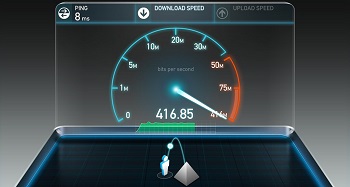
Fast, affordable Internet access for all.


On the most recent episode of the Connect This! Show, co-hosts Christopher Mitchell (ILSR) and Travis Carter (USI Fiber) were joined by regular guests Doug Dawson (CCG Consulting) and Kim McKinley (UTOPIA Fiber) tackle the hard questions in digital equity work now that the ACP is going away. Among the discussion: FCC Chair Jessica Rosenworcel's recent appearance at the national Net Inclusion conference, and what we can learn from her remarks about how to move ahead productively while avoiding easy mistakes and making sure we stay committed to the course.
Email us at broadband@communitynets.org with feedback and ideas for the show.
Subscribe to the show using this feed or find it on the Connect This! page, and watch on LinkedIn, on YouTube Live, on Facebook live, or below.
In this week’s round-up of broadband news, we culled three stories we think are worth reading.
How Much is Fast Enough?
The first is a story from Ars Technica – FCC chair: Speed standard of 25Mbps down, 3Mbps up isn’t good enough anymore – written by veteran IT reporter Jon Brodkin.
For years now, broadband-for-all advocates have lamented the FCC’s minimum broadband speed standard of 25 Megabits per second (Mbps) download and 3 Mbps upload as being laughably antiquated. Indeed, it’s been almost three years since we made the case for Why 25/3 Broadband Is Not Sufficient, though it was outdated long before then.

But as Brodkin reported this week, the FCC’s minimum speed standard “could finally change under Chairwoman Jessica Rosenworcel, who is proposing a fixed broadband standard of 100Mbps downloads and 20Mbps uploads along with a goal of bringing affordable service at those speeds to all Americans.”
Under Rosenworcel’s plan, the FCC would look at availability, speeds, and prices to determine whether the agency should take regulatory actions under Section 706 of the Telecommunications Act, which requires the FCC to determine if high-speed Internet access is being deployed "on a reasonable and timely basis" to all Americans.
The ongoing Covid-19 pandemic has highlighted the yawning gaps in broadband access throughout the country. Yet the Federal Communications Commission (FCC), in its 2020 Broadband Deployment Report released on April 24, found that “advanced telecommunications capability is being deployed on a reasonable and timely basis,” in effect turning a blind eye to the students parked outside libraries to access Wi-Fi, housebound seniors cut off from telehealth services, and struggling businesses left behind by the economy’s move online.
The agency came to this conclusion despite years of concern over how the FCC’s flawed data collection method systematically overstates broadband coverage. “We need to do a better job collecting data,” FCC Chairman Ajit Pai admitted nearly three years ago, adding, “It’s often said that you can’t manage what you can’t measure.”
2020 Report Lacks 20/20 Vision
Every year, the FCC must report on the expansion of Internet access in the country and determine whether broadband is being deployed in a “reasonable and timely fashion.”
In this year’s report, the FCC said, “Given the compelling evidence before us, we find for the third consecutive year that advanced telecommunications capability is being deployed on a reasonable and timely basis.” As support, the FCC noted:
The number of Americans lacking access to fixed terrestrial broadband service at 25/3 Mbps continues to decline, going down by more than 14 percent in 2018 . . . The vast majority of Americans — surpassing 85 percent — now have access to fixed terrestrial broadband service at 250/25.
As you plan your week, make sure you have access to YouTube early so you can livestream the "Opportunities for Bipartisan Tech Policy" from 9 a.m. - 12:30 EST. The event, which will be streaming from Washington, D.C., is sponsored by Next Century Cities (NCC), the American Action Forum, and Public Knowledge.
Check out the agenda for the event.
Distinguished Guests
In addition to keynote conversations from FCC Commissioner Jessica Rosenworcel and Senior Brookings Institution Fellow Blair Levin, our Christopher Mitchell will moderate a panel on rural broadband. The discussion on rural broadband will include input from:
Other panels will cover the topics of data privacy and security, and spectrum. Representatives from institutions such as the Georgetown Law Center on Privacty and Technology, the National Hispanic Media Coalition, and ALEC will also be attending; expect a spirited event. It’s a half-day filled with policy, described by Next Century Cities as:
[B]ringing together members of Congress, community leaders, and policy experts. Keynote conversations and panel discussions will work to determine key policy goals and action steps for the new Congress, with a specific focus on rural broadband, digital privacy and security, and spectrum legislation.
You can watch the livestream here and follow the conversation on Twitter: #BipartisanTech
On September 26th, Republican FCC Commissioners adopted an Order that usurps local control and, in keeping with this administration’s prior policy decisions, strengthens the power of the largest companies, obtaining nothing in return.
Bad Reasoning
At issue are local governments’ ability to determine the amount of fees to charge mobile carriers that want to place 5G equipment in rights-of-way. In addition to establishing fees, the Order sets strict timelines in which cities and towns must respond to carrier applications. The FCC decision eliminates local communities’ ability to negotiate in order to protect their own rights-of-way and the poles, traffic lights, and other potential structures in them.
To back up their decision to adopt the new policy, the Republican controlled FCC relied on the incorrect claims that application and attachment fees in larger communities are so excessive that they create a burden which prevents carriers from investing in rural communities. Former FCC Chief of Staff and one of the architects of the 2010 National Broadband Plan Blair Levin echoed the thoughts of policy analysts and thought leaders in telecommunications:
"[E]ven if one accepts the FCC claim about the $2.5 billion—which is highly questionable—that amount is about one percent of what the FCC and industry claim is the necessary new investment needed for next-generation network deployments and, therefore, is not likely to have a significant impact," he wrote.
The FCC does not require mobile carriers to commit to expanded coverage in smaller communities within the Order. Next Century Cities describes the situation in a press release:
These low fees would create a de facto public subsidization of industry investment. … The FCC is just giving private wireless companies all of the benefits of a utility without any traditional public interest obligations.
FCC Commissioner Jessica Rosenworcel, who has continued to oppose the Order, described the giveaway:
At the Institute for Local Self-Reliance, we often write about improving broadband availability. Access is only the first step. Even in places where broadband is available, it may be unaffordable. To that end, the National Digital Inclusion Alliance (NDIA) sponsors events in early May each year on the importance of digital inclusion and equity.
Public libraries, nonprofits, and many others take part. For instance, the Los Angeles Public Library is hosting a panel on digital inclusion, and there will also be a donation drive for old technology. Meanwhile, the Pacific Northwest College of Art will have a Digital Inclusion Summit focused on economic opportunity. Find an event near your, or register your own, at https://www.digitalinclusion.org/diw/ Connect online on Twitter, Facebook, or Instagram with #digitalinclusion, #DIW2018, and #DigitalEquityIs_____
Watch FCC Commissioners Mignon Clyburn and Jessica Rosenworcel speak about digital equity. Communities across the U.S. face many challenges, from the homework gap to digital redlining:
On January 18th, the FCC ended months of speculation and released a fact sheet that included several key conclusions to be included in the 2018 Broadband Deployment Report. The most important is that the FCC continues to recognize that mobile Internet access is not a substitute for fixed access. The Commission has also decided to leave the definition of broadband at 25/3 Mbps (down/up).
“Broadband” Will Not Slow Down
The Commission had proposed reverting to a slower definition of broadband from the current standard of 25 Megabits per second (Mbps) download and 3 Mbps upload. Under Tom Wheeler’s leadership, the FCC decided to update the standard to its current definition in January 2015, but current Chairman Ajit Pai and other Republican Commissioners suggested in last year’s Notice of Inquiry (NOI) that the FCC might effectively take us backward to a 10 Mbps/1 Mbps standard.
The suggestion rankled better connectivity advocates and Internet users. Many recognized that lowering the standards would make it easier for the FCC to proclaim that the U.S. was making strong progress toward universal household deployment. The Commission would have been justified making such a conclusion under the standard because large sections of rural American receive DSL, fixed wireless, satellite, or mobile Internet access that would meet a lowered 10/1 standard.
Hundreds of thousands of people, organizations, and businesses filed comments opposing a slower standard. Many of them live in areas where 10/1 speeds are already available but who have been waiting for better options. Commissioners Rosenworcel and Clyburn also spoke out against the lowering broadband speeds.
Commissioner Rosenworcel tweeted:

It has been several weeks, but Lisa and I wanted to answer any lingering questions people may have about the results of the Sixth Circuit case reviewing the FCC's action to remove state-created barriers to municipal networks. We devoted Community Broadband Bits episode 217 to the case and aftermath. The Sixth Circuit ruled against the FCC narrowly - finding that while it had no dispute with the FCC's characterization of municipal networks as beneficial, Congress had not given the FCC the power to overrule state management of its subdivisions (cities). As we have often said, restricting local authority in this manner may be stupid, but states are allowed to do stupid things (especially when powerful companies like AT&T and Comcast urge them to). Lisa and I explore the decision and explain why we are nonetheless glad that FCC Chairman Tom Wheeler and Commissioners Rosenworcel and Clyburn moved on the petitions from Chattanooga and Wilson to remove state barriers to next-generation network investment. We also reference this blog post from Harold Feld, which is a well-done summary of the situation.
This show is 20 minutes long and can be played on this page or via Apple Podcasts or the tool of your choice using this feed.
Transcript below.
We want your feedback and suggestions for the show-please e-mail us or leave a comment below.
Listen to other episodes here or view all episodes in our index. See other podcasts from the Institute for Local Self-Reliance here.
Thanks to Roller Genoa for the music, licensed using Creative Commons. The song is "Safe and Warm in Hunter's Arms."
Patrick Lucey of the Open Technology Institute at the New America Foundation, posted this excellent story around the time we published our rant about the FCC's cave-in to industry pressure for no good reason. We liked it so much, we asked to repost it.